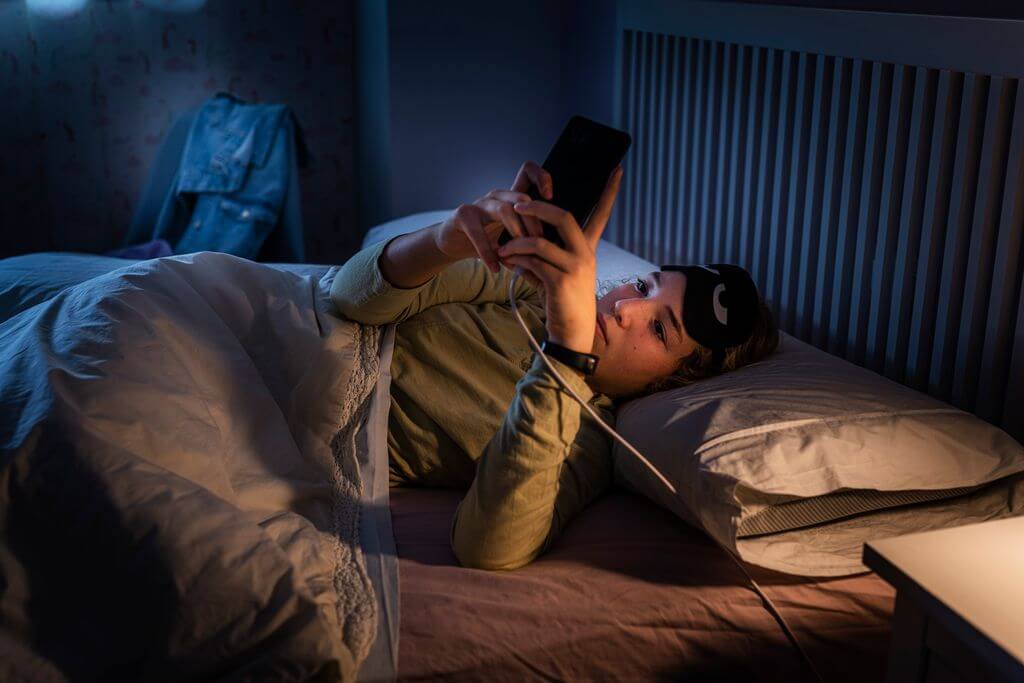
How to Adjust to Daylight Savings Time Fallback With Sleep Breakthrough


How to Adjust to Daylight Savings Time Fallback With Sleep Breakthrough
If this (week?) feels unusually tough, you can likely blame the time change. Every year, as daylight savings time (DST) ends, we “fall back” by an hour. While that extra hour of sleep might sound appealing, many people experience the opposite. In fact, a 2013 study published in Sleep Medicine Reviews found that this time of year is linked to net sleep loss.
The sudden change in our schedules can disrupt our internal clocks, making it harder to adjust and maintain consistent sleep patterns. The good news is that there are things you can do to ease this transition. Below, we dive into how sleep supplements, like Sleep Breakthrough, can be a game-changer when it comes to getting your body back on track after DST.

Why Am I So Tired After Daylight Savings Time Fallback?
Many of us likely relish in the anticipation of an extra hour of shut-eye in the fall. Yet, when the time actually comes to fall back, it can leave us feeling sluggish and fatigued.
Experts have compared the health effects of these seasonal time shifts to jet lag. Much like adjusting to a new time zone after a flight, you might notice you feel more tired, irritable, or disoriented as your body readjusts. Consistency is key to good sleep, and any change to your routine can have a ripple effect. First, let’s learn why you’re so tired during this time of the year. Then, we’ll cover what you can do about it.
Circadian Rhythm
Our bodies are equipped with an internal clock, known as the circadian rhythm. This key aspect of our physiology governs our body’s sleep-wake cycles. It relies on cues like light exposure and regular routines to maintain a 24-hour pattern. When we fall back during daylight savings time, the sudden shift in time can confuse this clock.
Disruptions to our circadian rhythm can even affect:
- Mental health
- Temporary cognitive issues like memory lapses, concentration difficulties, and slower reaction times
- Sleep: You may find it harder to fall asleep, wake up multiple times during the night, or rise earlier than usual.
It typically takes four to five days to adjust fully. Short sleepers (those who get less than 7.5 hours a night) and morning people tend to struggle more with this time shift than night owls. Even those who typically sleep longer than 8.5 hours may find their sleep disrupted in the days following the time change.
Darkness and Shorter Days
In addition to the time change, the end of daylight savings time also marks the arrival of shorter days and longer nights. While mornings may be brighter, the days are getting shorter, and many people finish work after dark, reducing their opportunity to get sunlight. Suddenly, our body becomes out of sync with our usual external environment. Even though the time change gives us an extra hour, the disruption can make it harder to fall asleep or wake up at the right times.
Less daylight means your body produces more melatonin; the hormone that supports sleep induction. This can leave you feeling drowsy earlier in the day. Unlike the gradual change in daylight hours that leads up to daylight saving time, this abrupt time shift can be a shock to the body. This increased darkness can affect your mood, energy levels, and overall alertness, contributing to the grogginess that many experience in the fall and winter months.

Too Much Stimulant Consumption Late in the Day
It can be tempting to reach for coffee or other stimulants as you struggle to stay awake through the afternoon. This works like a high-interest payday loan on your energy, making you more tired in the long run.
A late afternoon coffee can boost your energy in the short term. However, it will destroy your sleep quality even if you can fall asleep just fine. Caffeine has a half-life of about 5 hours, or longer if you have slow caffeine metabolism genes. A cup of joe at 2 PM with 80 mg of caffeine could leave about 20 mg of caffeine in your system by midnight. This leftover caffeine will significantly reduce your sleep quality, even if you could fall asleep just fine, worsening fatigue the next day. You’ll then need more caffeine, which continues to interfere with your sleep quality. It’s a vicious cycle.
You can use a little caffeine to wake up in the morning, but cut it out by 12 PM. If you have to, take a quick nap or a quick burst of exercise to boost your energy in the afternoon. Instead, you want to maximize your sleep quality in order to minimize fatigue.
How Does Sleep Breakthrough Help With Daylight Savings Time Fallback?
Here’s how Sleep Breakthrough can help.
Optimize Sleep Quality
Sleep Breakthrough supports multiple aspects of sleep regulation, including:
- Increasing your desire to go to sleep
- Supporting your ability to sleep throughout the night
- Improving sleep quality, so you wake up feeling refreshed and energized
Supporting sleep quality can ease the transition when we fall back during daylight savings time, helping your body adjust more smoothly. By improving the quality of your sleep, it helps reinforce your body’s circadian rhythm. When sleep is deep and consistent, it allows your body to adapt more quickly to external changes – such as the sudden time shift that happens with daylight savings time. Focusing on high-quality sleep ensures your internal clock realigns with the new schedule, helping reduce grogginess and fatigue that can occur with time changes.
Good sleep quality also means less nighttime awakenings, which can help your body feel more refreshed despite the time change. Interruption-free sleep is essential to help support key processes like hormone production and energy metabolism, which are especially important when adjusting to time changes.
Despite the extra hour of sleep we get when “falling back”, chronically poor sleep quality can make this transition even harder. By focusing on improving your sleep quality before and after the time change, you can minimize sleep debt – which can amplify the negative impacts of time shifts.
In short, improving your sleep quality ensures that your body is better equipped to handle the abrupt time shift, helping you maintain energy levels, mood, and overall well-being during the seasonal transition. Our carefully selected formula is designed to support various biochemical pathways related to supporting your body’s natural sleep patterns, with a specific focus on giving your body what it needs for optimal sleep quality. Combined, all the ingredients in Sleep Breakthrough work synergistically to optimize sleep quality, helping you adjust to the shifts in daylight savings time.

Provide Key Building Blocks for Healthy Melatonin Production
Daylight saving time can disrupt the body’s natural melatonin production. Melatonin, which is responsible for regulating your circadian rhythm and sleep cycle, can be thrown off during this time shift. Sleep Breakthrough provides key ingredients to support your body’s natural production of melatonin, without any melatonin in the product!
Vitamin B6 plays a crucial role in the production of melatonin. It supports the conversion of amino acid tryptophan into serotonin, which is a precursor to melatonin. In short, vitamin B6 supports your body’s biochemical pathway that eventually leads to melatonin formation, helping your body naturally produce this sleep hormone when it is time to rest.
Zinc works synergistically with Vitamin B6 to aid melatonin production. It supports overall neurotransmitter function and helps regulate the body’s internal clock. In fact, studies show that adequate zinc levels improve sleep quality and help maintain consistent melatonin production.
Magnesium is also a cofactor for melatonin production. A magnesium deficiency can hinder healthy melatonin levels. In addition, magnesium is a cofactor for the breakdown of cortisol, a daytime hormone that tends to oppose melatonin. It helps regulate neurotransmitters, such as GABA, that help calm the nervous system and prepare your body for sleep, which can ensure that your body is in an optimal state to produce melatonin.
Potassium interacts with melatonin in many cells. Insufficient potassium intake, found in 98% of Americans, can interfere with melatonin production and sleep. It also helps regulate electrolyte balance and support muscle and nerve function. Bioavailable potassium can help make sleep cycles more stable, and reduce nighttime disruptions – helping your body stay on track with melatonin production.
Together, these nutrients ensure your body has the right building blocks to produce melatonin naturally, promoting a smoother transition as your sleep schedule shifts.
Supporting Sleep Through Various Other Pathways Without High Doses of Melatonin

Sleep Breakthrough targets multiple other sleep-related pathways – all without relying on high doses of melatonin. We intentionally omitted melatonin as high doses of it can disrupt your circadian rhythm and natural melatonin secretion.
Instead, we focused on supporting your body’s natural sleep physiology, including gamma-aminobutyric acid (GABA), glycine, and L-theanine. Combined, these ingredients calm the nervous system, promote relaxation, and help ensure smoother sleep cycles during the seasonal adjustment to daylight savings time.
GABA
GABA is an important neurotransmitter for promoting relaxation. Studies find that supplementing with GABA can help reduce stress and improve sleep. It works by reducing the excitability of neurons, and slowing down brain activity, which can help quiet a racing mind that may negatively impact sleep. This is particularly useful when adjusting to daylight saving time, as the time change can throw off your normal routine and make it harder to unwind at the end of the day.
Glycine
Glycine is a neurotransmitter with unique roles in supporting sleep. It promotes a decrease in core body temperature – a natural signal to your brain that it is time to go to bed. Colder body temperatures encourage your body to enter deeper sleep stages more quickly, which can enhance not only the duration but the quality of sleep as well. When the clocks fall back, glycine can help support your body’s adjustment to the altered schedule. By facilitating a smoother sleep transition, and promoting a more restorative sleep, it can help combat fatigue and grogginess seen during this time of year.
L-Theanine
L-theanine is a compound found naturally in tea leaves. It supports relaxation and works by promoting a specific brain state characterized by alpha waves. Alpha waves are linked to feelings of calmness and help ease the transition from wakefulness to sleep. This can make it easier to relax and fall asleep naturally, even when daylight saving time throws off your usual bedtime.
Conclusion
Seasonal changes can be tough on your physical and mental health. Adjusting to daylight savings time will be much smoother once you optimize your sleep quality before, during, and after daylight saving time fallback. Sleep Breakthrough offers a gentle approach to maintaining restful sleep as we turn back the clocks. Sleep Breakthrough is available in three unique formulations – Blueberry Dreams and Tropical Dreams, in a delicious powder formula, or as capsules. With the right support, you can transition seamlessly into darker months, and wake up feeling refreshed and optimal every morning.
References
- Harrison Y. The impact of daylight saving time on sleep and related behaviours. Sleep Med Rev. 2013;17(4):285-292. doi:10.1016/j.smrv.2012.10.001
- Triantafillou S, Saeb S, Lattie EG, Mohr DC, Kording KP. Relationship between sleep quality and mood: Ecological momentary assessment study. JMIR Ment Health. 2019;6(3):e12613. doi:10.2196/12613
- Gardiner C, Weakley J, Burke LM, et al. The effect of caffeine on subsequent sleep: A systematic review and meta-analysis. Sleep Med Rev. 2023;69:101764. doi:10.1016/j.smrv.2023.101764
- Bediz CS, Baltaci AK, Mogulkoc R. Both zinc deficiency and supplementation affect plasma melatonin levels in rats. Acta Physiol Hung. 2003;90(4):335-339. doi:10.1556/APhysiol.90.2003.4.7
- Peuhkuri K, Sihvola N, Korpela R. Dietary factors and fluctuating levels of melatonin. Food Nutr Res. 2012;56(1):17252. doi:10.3402/fnr.v56i0.17252
- Billyard AJ, Eggett DL, Franz KB. Dietary magnesium deficiency decreases plasma melatonin in rats. Magnes Res. 2006;19(3):157-161.
- Souza ACR, Vasconcelos AR, Dias DD, Komoni G, Name JJ. The integral role of magnesium in muscle integrity and aging: A comprehensive review. Nutrients. 2023;15(24). doi:10.3390/nu15245127
- Arab A, Rafie N, Amani R, Shirani F. The role of magnesium in sleep health: A systematic review of available literature. Biol Trace Elem Res. 2022;201(1):121-128. doi:10.1007/s12011-022-03162-1
- Faclm MGM. 98% of American diets potassium-deficient. Nutritionfacts.org. May 23, 2013. Accessed October 18, 2024. https://nutritionfacts.org/blog/98-of-american-diets-potassium-deficient/
- Li M, Heizhati M, Wang L, et al. 24-hour urinary potassium excretion is negatively associated with self-reported sleep quality in the general population, independently of sleep-disordered breathing. J Clin Sleep Med. 2022;18(11):2589-2596. doi:10.5664/jcsm.10168
- Kanclerska J, Wieckiewicz M, Szymanska-Chabowska A, et al. The relationship between the plasma concentration of electrolytes and intensity of sleep bruxism and blood pressure variability among sleep bruxers. Biomedicines. 2022;10(11). doi:10.3390/biomedicines10112804
- Drennan MD, Kripke DF, Klemfuss HA, Moore JD. Potassium affects actigraph-identified sleep. Sleep. 1991;14(4):357-360.
- Hepsomali P, Groeger JA, Nishihira J, Scholey A. Effects of oral gamma-aminobutyric acid (GABA) administration on stress and sleep in humans: A systematic review. Front Neurosci. 2020;14:923. doi:10.3389/fnins.2020.00923
- Kawai N, Sakai N, Okuro M, et al. The sleep-promoting and hypothermic effects of glycine are mediated by NMDA receptors in the suprachiasmatic nucleus. Neuropsychopharmacology. 2014;40(6):1405-1416. doi:10.1038/npp.2014.326
- Bannai M, Kawai N. New therapeutic strategy for amino acid medicine: glycine improves the quality of sleep. J Pharmacol Sci. 2012;118(2):145-148. doi:10.1254/jphs.11r04fm
- Baba Y, Takihara T, Okamura N. Theanine maintains sleep quality in healthy young women by suppressing the increase in caffeine-induced wakefulness after sleep onset. Food Funct. 2023;14(15):7109-7116. doi:10.1039/d3fo01247f
